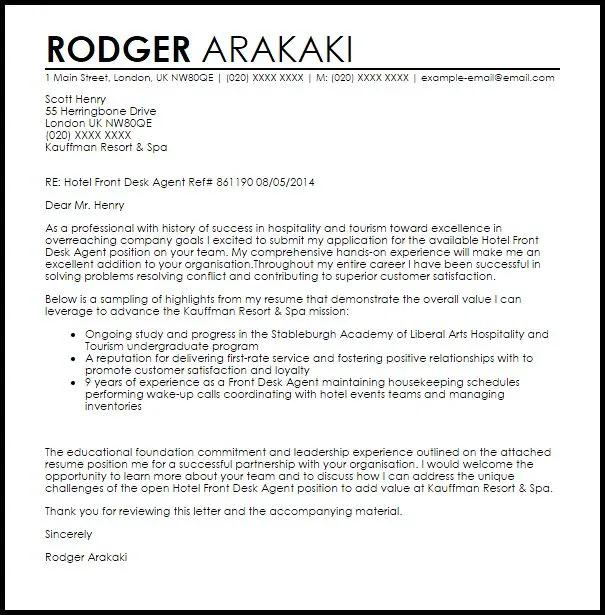Why a Cover Letter Matters for Front Desk Agents
In the competitive world of job applications, a cover letter is your chance to make a strong first impression, especially for front desk agent positions. Unlike a resume, which primarily lists your skills and experience, a cover letter allows you to showcase your personality, enthusiasm, and understanding of the specific role and company. It’s your opportunity to connect with the hiring manager on a more personal level, demonstrating why you’re the perfect fit. A well-crafted cover letter highlights your unique qualifications and career aspirations, setting you apart from other applicants and increasing your chances of getting an interview. Think of it as your personal introduction, selling yourself and your skills to the potential employer before they even meet you. Without a cover letter, you risk being seen as just another resume in a pile, so it’s a crucial element in landing your dream job as a front desk agent.
Highlighting Relevant Skills and Experience
When writing your cover letter, focus on the skills and experience that directly align with the requirements of the front desk agent position. Start by carefully reviewing the job description and identifying the key qualifications the employer is seeking. Then, use your cover letter to highlight how your previous roles, education, and training have equipped you with those skills. Be specific and provide concrete examples of how you’ve demonstrated these skills in the past. For example, if the job description mentions excellent communication skills, describe a time when you successfully resolved a customer issue using clear and effective communication. Similarly, if the role requires proficiency in a specific software, mention your experience using it and your ability to quickly learn new systems. Your goal is to demonstrate that you not only possess the necessary skills but also have a proven track record of applying them successfully.
Communication and Interpersonal Skills
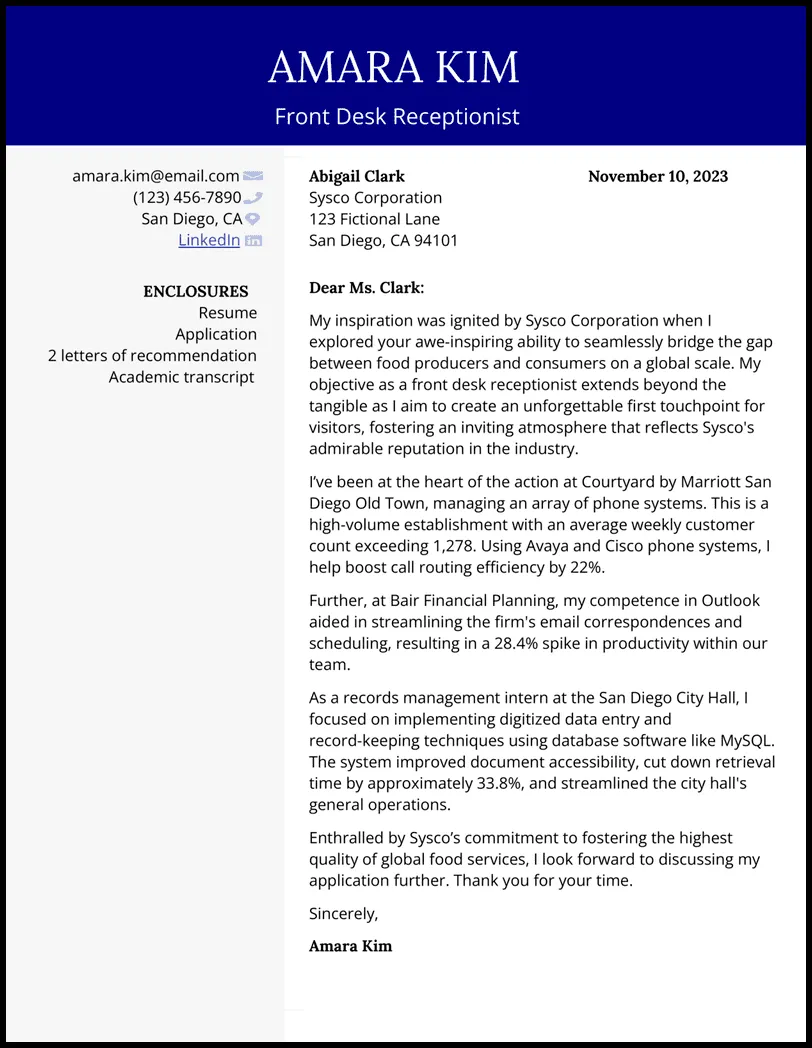
Front desk agents are the first point of contact for customers and visitors, making strong communication and interpersonal skills essential. In your cover letter, emphasize your ability to communicate clearly, both verbally and in writing. Provide examples of how you’ve effectively interacted with diverse individuals, handled difficult situations with tact and professionalism, and built rapport with customers. Highlight your active listening skills, your ability to understand and respond to customer needs, and your capacity to convey information in a friendly and helpful manner. Mention any experience you have in conflict resolution, problem-solving, and de-escalation techniques. Demonstrate your ability to create a welcoming and positive environment, as this is a crucial aspect of the front desk agent role and often the first impression a client or customer gets from a business.
Customer Service Expertise
Customer service is at the heart of the front desk agent role. Your cover letter should showcase your dedication to providing exceptional customer service. Share instances where you went above and beyond to assist customers, exceeded their expectations, and resolved their issues. Highlight your ability to handle complaints with empathy, find solutions quickly, and ensure customer satisfaction. Mention any training or certifications you have received in customer service, and emphasize your commitment to creating a positive customer experience. Provide specific examples of how you’ve handled difficult situations or resolved customer complaints, demonstrating your problem-solving skills and your ability to remain calm and professional under pressure. Make it clear that you understand the importance of customer loyalty and are passionate about creating positive interactions.
Technical Proficiency
Front desk agents often use a variety of software and technologies to perform their daily tasks. Your cover letter should highlight your proficiency in relevant software, such as Microsoft Office Suite, CRM systems, or any industry-specific programs. If you have experience with appointment scheduling software, phone systems, or other office equipment, be sure to mention it. Detail your ability to quickly learn new technologies and adapt to different systems. Explain how you have used these skills to improve efficiency, streamline processes, or enhance the customer experience. If the job description mentions specific software or technologies, make sure to explicitly address your experience with them, demonstrating your ability to fulfill the technical requirements of the role. Highlight your ability to use different software and systems to manage information effectively and contribute to smooth and efficient operations.
Showcasing Achievements
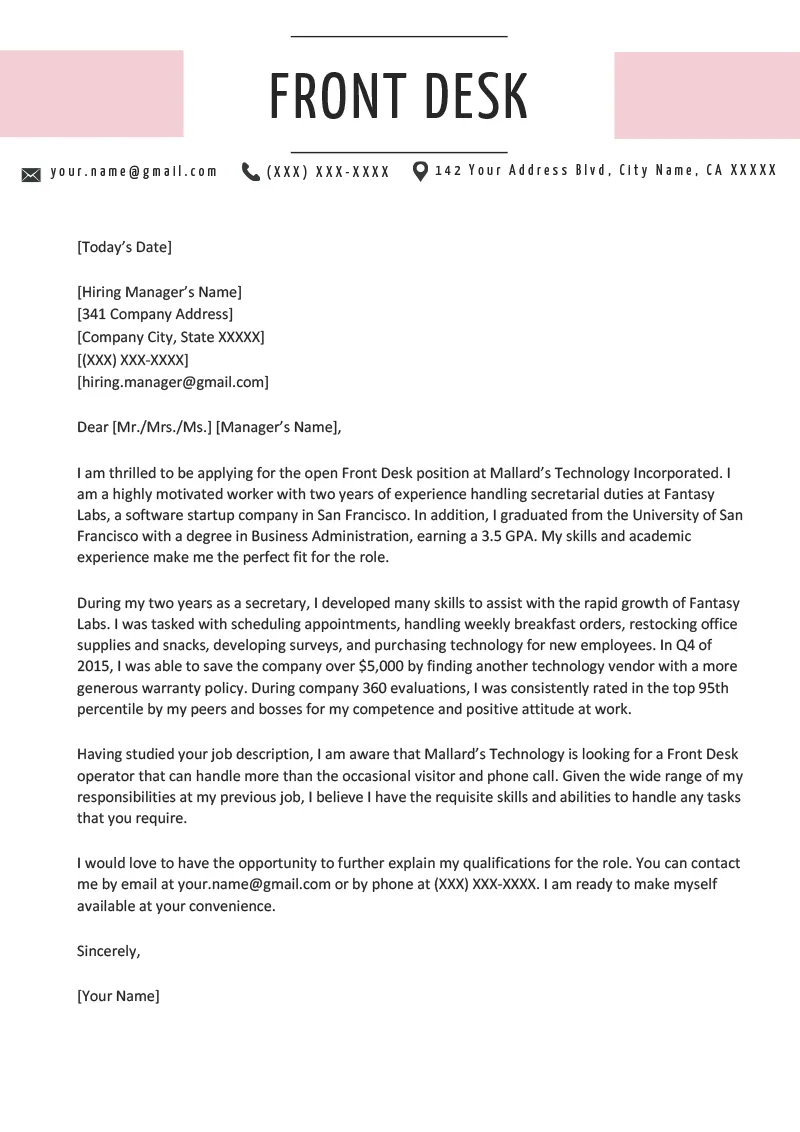
Instead of simply listing your job duties, use your cover letter to showcase your achievements and the positive impact you’ve made in previous roles. Quantify your accomplishments whenever possible by using numbers, percentages, or specific metrics. For example, instead of saying you ‘improved customer satisfaction,’ state that you ‘increased customer satisfaction scores by 15%.’ This gives the hiring manager tangible evidence of your capabilities and demonstrates your ability to deliver results. Focus on achievements that align with the front desk agent role, such as improving customer service, increasing efficiency, or contributing to a positive work environment. Your achievements should be a mix of tangible results that demonstrate your ability to contribute to the business’s success. By highlighting your achievements, you’ll make your cover letter more memorable and demonstrate your value as a candidate.
Quantifying Accomplishments
One of the most effective ways to showcase your achievements is by quantifying them. Whenever possible, use numbers and data to illustrate the impact of your work. For example, instead of stating that you ‘managed customer inquiries,’ you could say that you ‘handled an average of 50 customer inquiries per day with a 95% satisfaction rating.’ By using numbers, you provide concrete evidence of your abilities and make your achievements more compelling. Use percentages to show improvements, such as ‘reduced call waiting times by 20%’ or ‘increased sales by 10%.’ If you have experience with data analysis, use numbers to show how you contributed to data driven results. Quantifying your accomplishments not only demonstrates your skills but also showcases your ability to measure and analyze the results of your work.
Tailoring Your Cover Letter to the Job
Avoid sending a generic cover letter. Tailor each cover letter to the specific job and company you’re applying to. Carefully review the job description and identify the key requirements and desired skills. Then, use your cover letter to highlight how your skills and experience align with those requirements. Research the company and learn about its values, culture, and mission. Demonstrate your understanding of the company and its industry in your cover letter. Explain why you are interested in working for that specific company and how your skills and experience can contribute to its success. Address the hiring manager by name, if possible, and personalize your content to show that you’ve taken the time to learn about the position and the company. Customizing your cover letter will show that you are genuinely interested in the opportunity and increase your chances of getting an interview.
Researching the Company
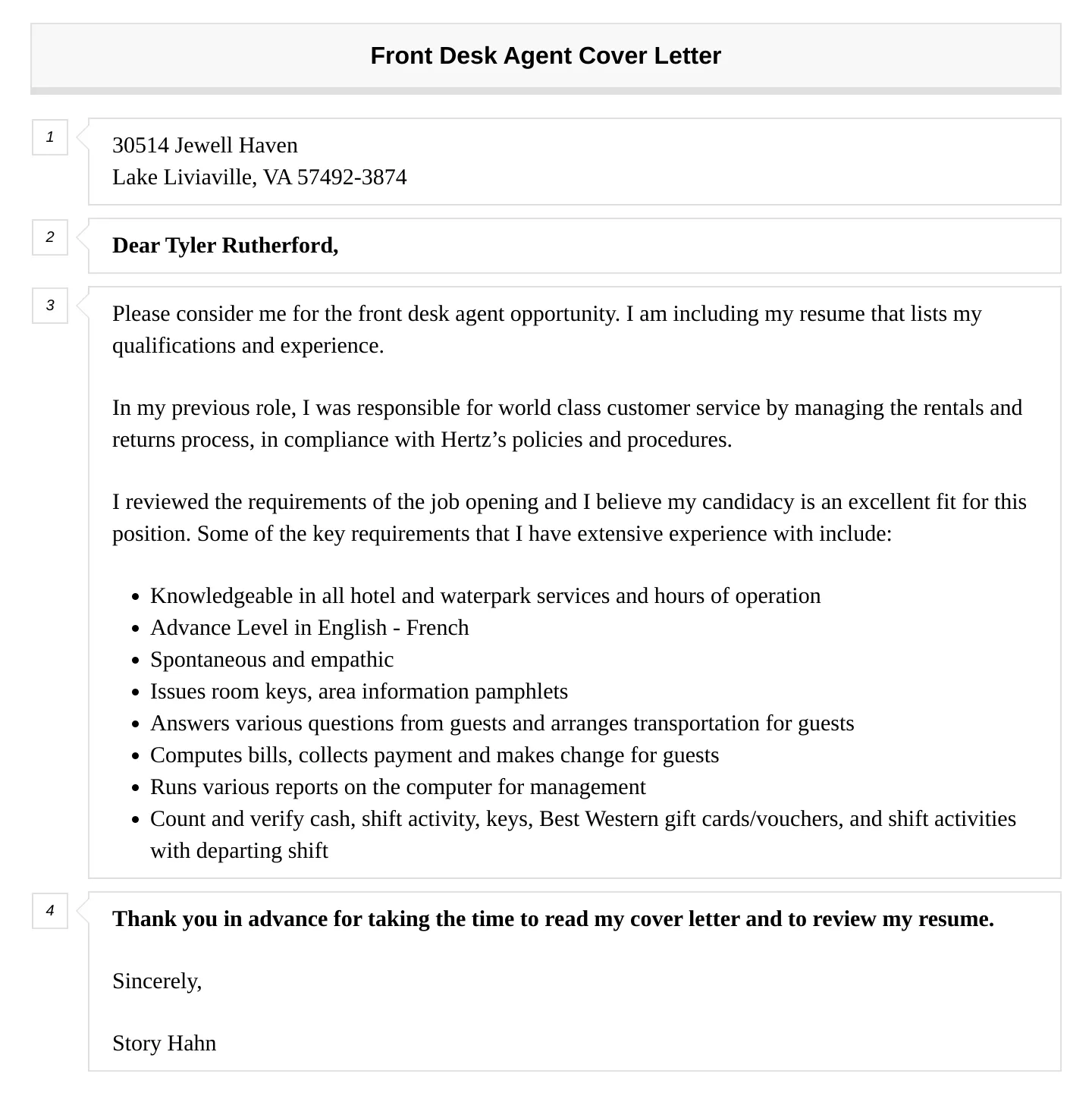
Before writing your cover letter, thoroughly research the company to which you are applying. Visit their website, read news articles, and check out their social media presence to gain a better understanding of their mission, values, and culture. This information will help you tailor your cover letter to align with the company’s specific needs and expectations. Identify any recent achievements, initiatives, or projects that the company has undertaken. Mention these in your cover letter to demonstrate your awareness of their work and your genuine interest in joining their team. If possible, research the hiring manager’s background and experience. Knowing their interests and priorities can help you tailor your letter to make a stronger connection. Showing that you have taken the time to learn about the company will show your initiative and make you a more appealing candidate.
Customizing Your Content
Once you’ve researched the company, customize your cover letter to reflect your understanding of their needs and priorities. Use keywords and phrases from the job description throughout your letter, ensuring that your skills and experience directly align with their requirements. Highlight the specific aspects of the role and company that appeal to you, and explain how your skills and experience can contribute to their success. Mention any relevant projects or experiences that you’ve had that showcase your ability to excel in the role. Tailor your tone and writing style to match the company’s culture. This shows the hiring manager that you have taken the time to understand their business and that you are a good fit. Personalizing your cover letter will make it stand out from generic applications and increase your chances of getting an interview.
Formatting and Proofreading
The appearance of your cover letter is just as important as its content. Pay careful attention to formatting, grammar, and spelling. Use a professional font, such as Times New Roman or Arial, and maintain a consistent font size throughout your letter. Use clear and concise language, and avoid jargon or overly complex sentences. Break up your text into short paragraphs to make it easy to read. Proofread your cover letter multiple times to catch any errors. Ask a friend or family member to review it for you. A well-formatted and error-free cover letter demonstrates professionalism and attention to detail, which are essential qualities for a front desk agent. It shows that you value your work and are meticulous in your approach to detail.
Ensuring Professionalism
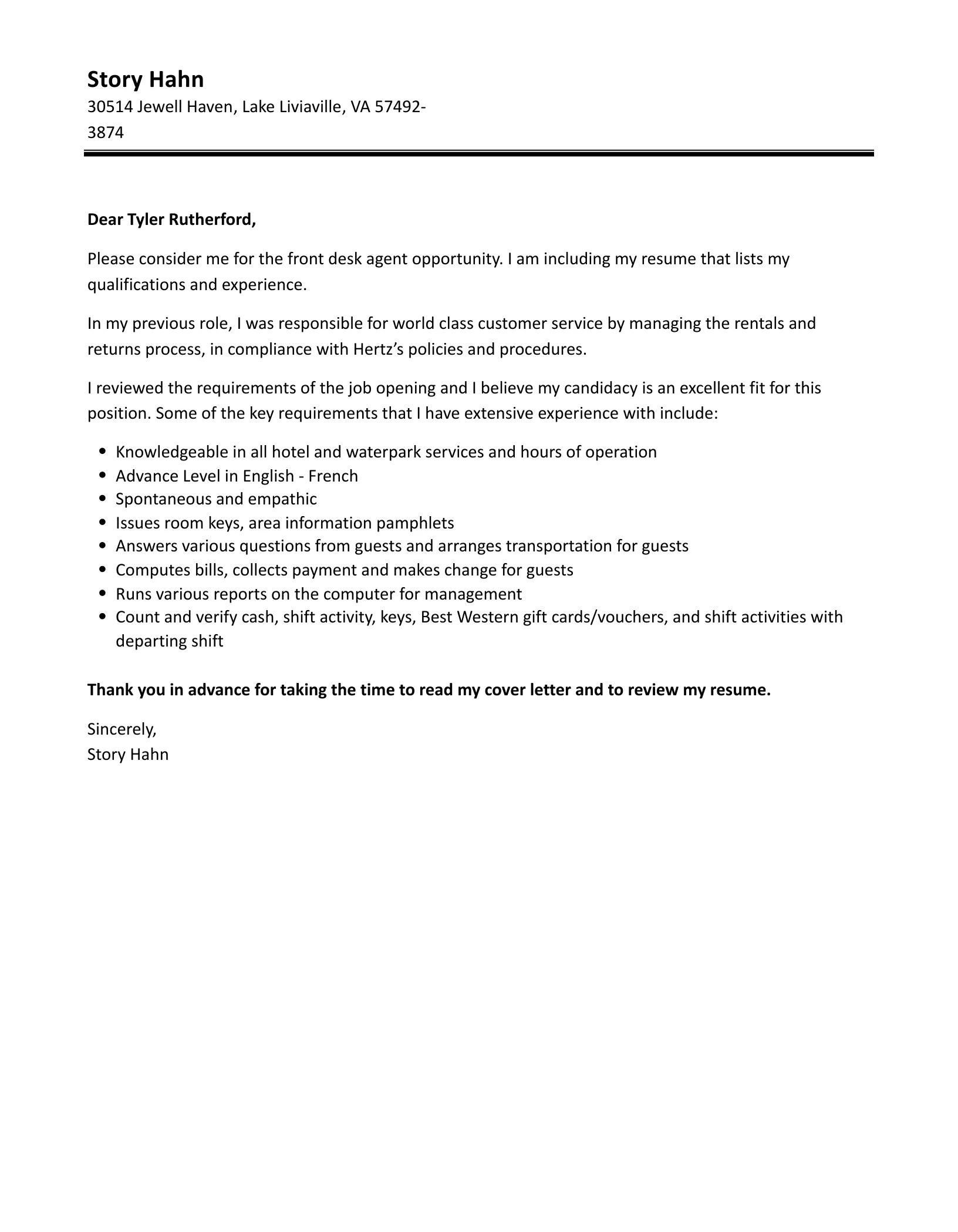
Your cover letter should always maintain a professional tone. Use a formal salutation, such as ‘Dear Mr./Ms. [Last Name],’ and a professional closing, such as ‘Sincerely’ or ‘Best regards.’ Avoid using slang, informal language, or emojis. Keep the tone positive and enthusiastic, but avoid being overly casual or familiar. Make sure your contact information is clearly displayed at the top of your letter, including your name, phone number, email address, and LinkedIn profile (if applicable). Your cover letter should reflect the same level of professionalism you would display in person, showing the hiring manager that you understand and value professional communication. The way you present yourself in your cover letter sets the tone for your potential interactions with the company, so it’s important to make a positive and professional impression.
Top 5 Cover Letter Tips for Front Desk Agents
- Highlight relevant skills and experience, focusing on communication, customer service, and technical proficiency.
- Showcase achievements and quantify accomplishments using numbers and data.
- Tailor your cover letter to each job and company by researching the organization and customizing your content.
- Format your cover letter professionally, ensuring it is free of errors and easy to read.
- Maintain a professional tone throughout your cover letter, demonstrating your understanding of professional communication.
